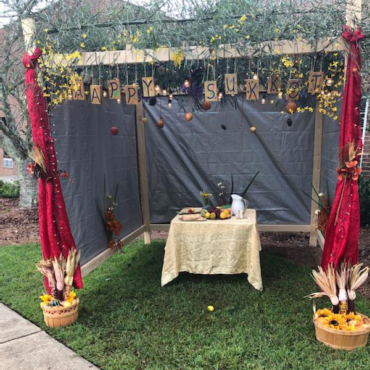Sukkot: An Encouraging Perspective

Beginning at sundown on September 20th and continuing to September 27th, the Jewish community will celebrate the Feast of Sukkot, (pronounced Su-kot) or ‘Tabernacles’. Sukkot is also called the Feast of the Harvest, and as a harvest feast, Sukkot reminds us of our Sovereign God’s wonderful provision for our lives.
Lev. 23 contains a statute for Jewish people to live in booths every year, reminding us of the wilderness journey from Egypt to the Promised Land: Ye shall dwell in booths seven days: all that are Israelites born shall dwell in booths: That your generations may know that I made the children of Israel to dwell in booths, when I brought them out of the land of Egypt: I am the Lord your God (Lev. 23:42-43).
The Sukkot festival consists of seven days of continual, joyous celebration, with ‘the Great Day of the Feast,’ called Hoshanna Rabbah, on the 7th day, followed by a solemn assembly on the eighth day. Sukkot is the culmination of all feasts on God’s redemptive calendar, and points prophetically to the end-time harvest of souls.
Sukkot also reminds us to renew our perspective on how we use our time, talent and treasure for the greatest spiritual impact and blessing. In the days of Haggai, the prophet, the Feast of Sukkot offered a fascinating opportunity for the people to appreciate all that God would do for them, as it does for us today!
A Problem of Perspective
God’s people were dealing with a problem of perspective, and the prophet Haggai exposed their selfish priorities, which had led them to a superficial point of view.
After returning from the Babylonian Captivity, Israel had prioritized the rebuilding of God’s house before building their own (Haggai 1:9), but when they realized the new temple would be smaller than the previous Temple of Solomon, they became discouraged (Haggai 2:3; Ezra 3:12) and didn’t want to continue.
We can all relate to the discouraging problem that life isn’t always as glorious as we had hoped it would be. It’s easy to lose perspective and not appreciate all that God has done and is doing, according to His agenda, especially when we may have had our own agenda.
Principles for a Proper Perspective
What does God do when we’re discouraged? In compassion for His people, God gives us His word – His promise – so that in the present life we’re living we can rejoice and fulfill His purpose for our lives. Here are a few principles to remember.
Know His Presence
The first principle is to know His presence: “’Take courage,’ declares the LORD, ‘and work; for I am with you’” (Haggai 2:4). Take courage, that is, be strong, encouraged, and confident and get to work! We need encouragement and confidence to work, for we can “grow weary in well-doing” (Gal. 6:9).
But how do we gain encouragement when we’re discouraged? Know that the Lord is with you. No matter what the job or struggle He called you to, He’ll never leave you, nor forsake you! (Joshua 1:9).
He did not create you to do a work apart from Him! Apart from Him you can do nothing, but you “can do all things through Messiah who strengthens you” (Phil. 4:13).
Know His Promise
The second principle is to know His promise: “As for the promise which I made you when you came out of Egypt, My Spirit is abiding in your midst; do not fear!” (Haggai 2:5). God keeps His word. Upon leaving Egypt, Israel knew that they could never succeed without God’s presence, so He told them: “I will dwell among the sons of Israel and will be their God” (Ex. 29:45). “And He said, ‘My presence shall go with you, and I will give you rest’” (Ex. 33:14).
The prophet Isaiah also refers to this promise to encourage the people of God to trust His word: “Then His people remembered the days of old, of Moses. Where is He who brought them up out of the sea with the shepherds of His flock? Where is He who puts His Holy Spirit in the midst of them?” (Isaiah 63:11).
Through Messiah Yeshua we have the promise of God’s presence through that same Spirit, the Holy Spirit, abiding with us and empowering us to serve Him: “For you have not received a spirit of slavery leading to fear again, but you have received a spirit of adoption as sons by which we cry out, “Abba! Father!’” (Romans 8:15).
Those unaware of God’s promise may base their lives on their own efforts – and isn’t that a discouraging thought! By His promises we who have believed on Messiah Yeshua have confidence, knowing that He has granted us, “according to the riches of His glory, to be strengthened with power through His Spirit in the inner man” (Eph. 3:16). We live by faith, not by fear. Our Lord’s promises are eternally dependable, for He is a God who cannot lie! (Titus 1:2).
Know His Priority
The third principle is to know His priority: “For thus says the LORD of hosts, ‘Once more in a little while, I am going to shake the heavens and the earth, the sea also and the dry land. I will shake all the nations’” (Haggai 2:6,7).
The New Covenant reiterates this verse in Hebrews 12:26, and then explains its application: “This expression, ‘Yet once more,’ denotes the removing of those things which can be shaken, as of created things, so that those things which cannot be shaken may remain. Therefore, since we receive a kingdom that cannot be shaken, let us show gratitude, by which we may offer to God an acceptable service of reverence and awe” (Heb. 12:27, 28).
God’s priority is for eternal matters only. Those things that can be removed will be removed and are not to be a focus or desire for us. Therefore, we are not to evaluate our lives on these passing matters, but by His eternal promises and hope for us.
As John put it, “Do not love the world nor the things in the world…the lust of the flesh and the lust of the eyes and the boastful pride of life…The world is passing away, and also its lusts; but the one who does the will of God lives forever” (1 John 2:15-17). All wealth is God’s: The silver is mine, and the gold is mine, saith the LORD of hosts” (Hag. 2:8). He is able to provide what He wills, when He wills.
Therefore, money should not be the objective of our faith, or our fears. In your life, are you disappointed because your treasure and talents don’t match your expectations?
The Desire of All Nations
Haggai explains as he continues in 2:7, “’…I will shake all the nations, and the Desire of all Nations will come, and I will fill this house with glory,’ says the LORD Almighty (KJV). What, or rather, Who is this Desire of all Nations? In our world people desire wealth, beauty, and power in a vain attempt to fill the void in their soul, a void that was created by sin.
That void is satisfied not by wealth, or anything else that is ‘removeable’, but by Messiah Himself: He is the true Desire of the Nations. He is the seed through Whom all nations of the earth would be blessed (see Gen. 22:18; Gal. 3:8-14). He is the humble King who entered Jerusalem on the colt of a donkey and of Whom it was promised “He shall speak peace unto the nations” (Zech. 9:9,10).
Yes, “the nations will resort to the root of Jesse, who shall stand as a standard to the peoples” (Isa. 11:10). This is Yeshua, the Messiah of Israel, the Desire of all Nations, “the Savior of the world” (John 4:42)!
A Different Kind of Glory
The temple they were building may not have looked like much at that time, but God promised, “The latter glory of this house will be greater than the former,’ says the LORD of hosts, ‘and in this place I will give peace,’ declares the LORD of hosts” (Hag.2:9). How would the latter glory of this smaller, less magnificent ‘house’ be greater than the glory of the former house (Solomon’s temple)?
Though this rebuilt temple seemed plain by comparison, God’s promise through Haggai would be fulfilled, not with mere silver and gold, but when the Lord of Glory Himself would enter into this very place! The Lord of Glory is He who was crucified (1 Cor. 2:8) and was glorified in resurrection (Acts 3:31). But when did Yeshua come to the Temple to fulfill this word?
The Great Day of the Feast
The prophecy was not for a future temple, but as Haggai writes, it is “this house”: specifically, the very temple that they were building during Haggai’s day, which ultimately was destroyed by the Romans in AD 70. The clue to this mystery of “the latter glory” is found in Haggai 2:1, “On the twenty-first of the seventh month. The word of the LORD came by Haggai the prophet.” Please note the date.
The Feast of Sukkot begins on the 15th day of the 7th month (Lev. 23:34,39). The 21st of that month is the 7th day of that feast, called the Great Day of the Feast, Hoshannah Rabbah, the Great Hosanna. It is called this because Jewish people from all the nations would come to Jerusalem to worship God at Sukkot (see Deut. 16:17).
Each day during Sukkot thousands in Jerusalem would follow the priest (cohen) back to the temple after he had gathered water from the pool of Siloam. Then the priest would circle the alter as thousands cried out, “Hoshiyanu”, or “Hosanna”, meaning “Save us now!”
The priest would then pour out the water, which pictured the Holy Spirit like “water as on dry land” (Isa. 44:3), and while pouring out the water, the priest would pray for God’s true provision for the people (this is found in the Talmud, Sukkah 34,51). But on the 7th day, the Great Day of the Feast, Hoshannah Rabbah, the people continued to cry out for salvation as the priest now circled the altar seven times.
It was on that day, the 21st of the 7th month, the very day of which Haggai prophesied, that the Desire of all Nations came to that Temple!
In John 7:2 we read that at Feast of Tabernacles Yeshua went to the Temple, and then at the water pouring ceremony, at the peak of public anticipation, came the dramatic moment: “Now on the last day, the great day of the feast, Yeshua stood and cried out, saying, ‘If anyone is thirsty, let him come to Me and drink. He who believes in me, as the Scripture said, “From his innermost being will flow rivers of living water.’ But this He spoke of the Spirit, whom those who believed in Him were to receive; for the Spirit was not yet given, because Yeshua was not yet glorified” (John 7:37-39).
“Come to Me”
Amazing! Thus, the word of the Lord from Haggai was fulfilled in Yeshua, for He is the Desire of all the Nations, and the Lord of Glory Who came to His Temple. And as Haggai concludes, “in this place I will give you peace.”
Yes, The Desire of all the Nations is the Prince of Peace Who offered peace then and offers peace still today. Do you thirst for more than life has offered? Messiah is still calling out today, for thirsty souls to come, drink, and be satisfied.
This Sukkot let us remember the presence, promises and priority of our God and how it is fulfilled in Messiah. Then let His presence strengthen you, His promise encourage you, and His priorities focus you to live for eternity, and to the glory of that Name that is above every Name, Yeshua! Happy Sukkot!




Add Comment